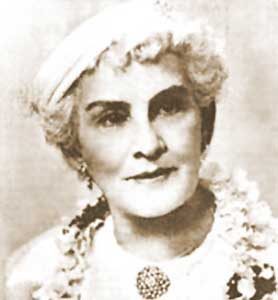
Nevada Historical Society, Reno
BERTHA EATON RAFFETTO
The information below has been compiled from a variety of sources. If the reader has access to information that can be documented and that will correct or add to this woman’s biographical information, please contact the Nevada Women’s History Project.
At A Glance:
Born: March 15, 1885
Died: September 6, 1952
Maiden Name: Eaton
Race/Nationality/Ethnic Background: Caucasian
Married: Henry Clyde Hough, Fiore Raffetto
Children: Three (two sons, one daughter)
Primary City and County of Residence and Work:
Reno (Washoe Co.)
Major Fields of Work: Music (composer, performer)
Other Role Identities: Wife, Mother, Educator (teacher), Poet, Women’s Club Leader, Civic Worker, Political Party Activist (Republican)
Bertha Eaton, born in Bloomfield, Iowa on March 15, 1885, was the daughter of Enoch Henry and Susan Frances Walker Eaton.
“Appreciation of good literature was fostered by Mother’s nightly Bible reading; all of the classics and fiction of that period; philosophy and science,” said Ms. Raffetto in her later life. By the age of thirteen, she had read Shakespeare, Ivanhoe, Thomas Paine, Voltaire. She and her three sisters were encouraged in self-expression by animated discussions at the family supper table. She gave her first poetry recital at the age of three from her grandfather’s pulpit where she “lisped” out a couple of verses. She wrote her first poem at age five. Music was a part of her daily enjoyment with special attention to sacred music.
Bertha was a school marm in the Ozarks. She went with the men on turkey shoots; She was an independent, free-thinking woman in an era when the woman’s place presumably was in the home.
Bertha Eaton married Henry Clyde Hough. They had two sons, one of whom died. She later married Fiore Raffetto, the man she had selected as her Reno divorce attorney. They were married for 30 years and had one daughter, Frances Cornelia. “In view of all the places my mother both visited and lived in for varying lengths of time, I have no doubt mother felt and meant it when she said ‘Home Means Nevada,'” said Mrs. Frances McDonald of Reno in 1952.
“Writing ‘Home Means Nevada’ was the most rewarding experience of my life . . .”
Bertha continued to work as a writer in Nevada. She composed music and poetry and was active in club and civic work. She was a fluent speaker and participated actively in Republican politics in numerous campaigns. During the 1930’s she conducted a “Poet’s Corner” in the Nevada State Journal which was a popular feature. She also sang and was a versatile song leader. Mrs. Raffetto was a twenty-five year member of the Reno Branch of Pen women, for whom she served as treasurer, vice president, president and state president. She was poet laureate of the Nevada Federation of Women’s Clubs and was awarded the Poet’s Parchment by the General Federation of Women’s Clubs for outstanding work in behalf of poets and poetry.
She was also a member of The Women’s Relief Corps, Reno Civic Club, Nevada and General Federation of Women’s Clubs, Order of Eastern Star, Daughters of the Nile, National Poetry Society, Poets of the Pacific, Virginia Poetry Society. As a delegate to a convention at Long Beach, California, of the Women’s Relief Corps and Grand Army of the Republic, she obtained the nucleus for the G.A.R. scholarship at the University of Nevada. She also attended the General Federation of Women’s Clubs at Boston in 1950 and the Pen Women’s Convention in Washington that same year.
Mrs. Raftetto’s major achievements include her composition, “Home Means Nevada,” the state song (for copy of song). Mrs. Raffetto’s poetry, articles and stories were published in many well-known magazines and newspapers. Another musical composition was “The Spirit of Democracy,” a concert march for band, which was broadcast from Washington, DC, by the U.S. Marine Band (date of broadcast unknown). “Home Means Nevada” was made the official Nevada State Song by an act of the legislature on February 6, 1933. She also published a narrative poem, “The Ballad of Katie Hoskins,” which was widely lauded by literary critics as “an outstanding example of fine American balladry.” It was used as a text by Columbia University.
Constantly asked why she wrote the song, “Home Means Nevada,” she eventually answered the question in an essay entitled “How and Why “Home Means Nevada” Came to be Written.” (Click here to read)
Mrs. Raffetto died September 6, 1952.
Biographical sketch by Sally Wilkins.
Sources of Information:
- Elko Daily Free Press. February 6, 1985.
- Obituary. Nevada State Journal. October 27, 1952.
- Vogel, Ed. “Reno Contralto Composes Song for Nevada.” Nevada Appeal. February 16, 1986.
